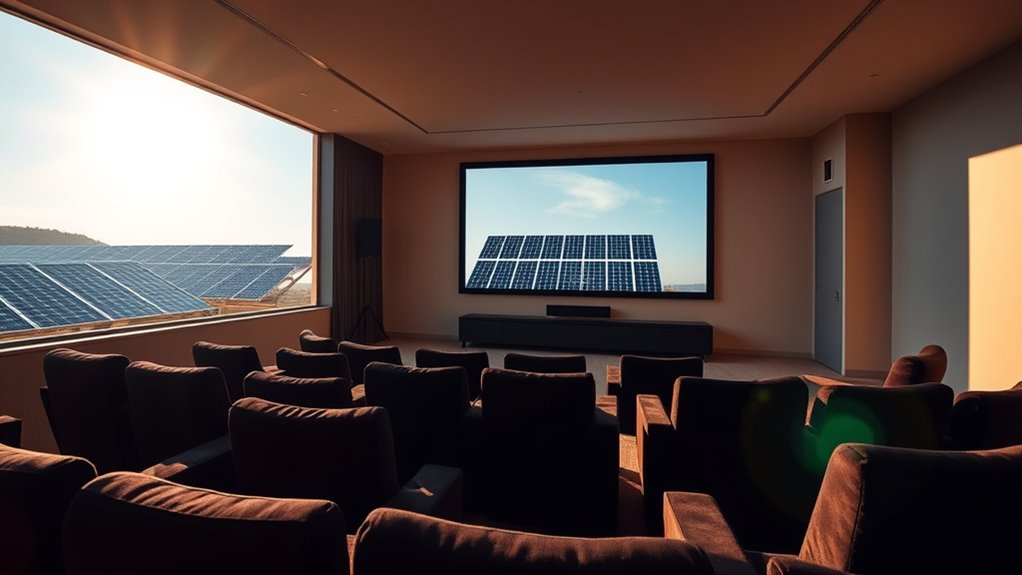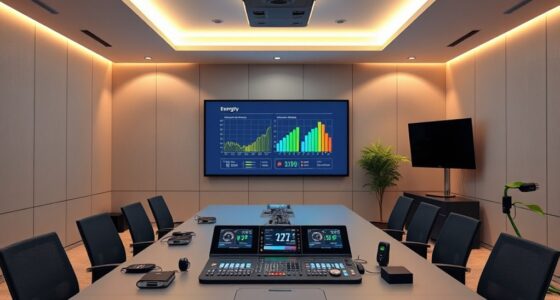Using solar panels to power your home cinema lets you enjoy movies while saving money and reducing your environmental impact. By harnessing sunlight, you can generate clean energy, lower your electricity bills, and support eco-friendly living. With the right setup, including batteries, you’ll have a steady power source even when the sun isn’t shining. Keep exploring how solar can transform your entertainment experience while making your home more sustainable.
Key Takeaways
- Solar panels can efficiently power home cinema equipment during the day, reducing reliance on the grid.
- Integrate battery storage to supply energy for your cinema during cloudy days or at night.
- Proper system design ensures stable, continuous power for projectors, sound systems, and streaming devices.
- Financial incentives and tax credits can offset initial installation costs for a home cinema setup.
- Using renewable energy minimizes environmental impact and enhances eco-friendly living while enjoying entertainment.

Watching movies at home is even more enjoyable when you can reduce your energy costs and environmental impact. If you’re considering ways to make your home cinema setup more sustainable, solar panel installation offers a practical solution. By harnessing the sun’s power, you can generate clean energy that directly supports your entertainment system, cutting down on electricity bills and lowering your carbon footprint. Solar panels work efficiently when properly installed, allowing you to take advantage of sunlight during the day to store or use energy immediately. This not only provides a steady power source for your home theater but also maximizes your energy savings over time.
Enhance your home cinema with solar panels—save energy, reduce costs, and enjoy sustainable entertainment.
When you opt for solar panel installation, you’re investing in a long-term energy solution. The initial setup might seem like a significant expense, but the benefits quickly outweigh the costs. As your system begins to produce electricity, you’ll notice a decrease in your monthly energy bills. Plus, many regions offer incentives or tax credits that can further reduce the upfront costs of installing solar panels. With consistent energy production, you’ll be less dependent on the grid, which means you’re less vulnerable to rate hikes and outages. Over the lifespan of your solar panel system—often 25 years or more—you’ll see substantial savings, making it a smart financial move alongside its environmental benefits.
Having solar panels also means you’re doing your part for the environment. Reducing reliance on fossil fuels decreases greenhouse gas emissions, helping combat climate change. Your home cinema becomes not just a source of entertainment but also a symbol of eco-conscious living. During the day, your solar system can generate enough power to run your projector, sound system, and streaming devices, ensuring your movie nights are powered by renewable energy. When sunlight isn’t available, many systems incorporate batteries to store excess energy, so you can enjoy your movies even during cloudy days or at night without drawing extra power from the grid. Properly integrating battery technologies can maximize your energy independence and ensure uninterrupted entertainment.
In essence, solar panel installation transforms your home entertainment setup into a more sustainable venture. As you enjoy your favorite films, you’ll appreciate knowing that your energy is coming from a clean, renewable source. The combination of reduced energy costs and environmental benefits makes solar panels a compelling upgrade for any home cinema enthusiast. With proper planning and investment, you’ll enjoy countless movie nights fueled by the sun’s energy—saving money, reducing your carbon footprint, and enhancing your home’s overall sustainability.

Douk Audio BS-1 Bass Shaker: 50W High Power Tactile Transducer - Subwoofer Lows for Home Theater, Car Audio & Gaming Chair Vibration Immersion (1 PC)
The fully upgraded version of Douk Audio BS-1 bass shaker, released in May 2025, the performance is greatly...
As an affiliate, we earn on qualifying purchases.
Frequently Asked Questions
How Much Do Solar Panels Cost for a Home Cinema Setup?
The cost of solar panels for your home cinema setup typically ranges from $5,000 to $15,000, depending on system size and installation complexity. You should consider the cost breakdown, including panels, inverters, and installation fees. Financing options like loans or leasing can make it more affordable. Assess your energy needs carefully to determine the right system size and find the best payment plan for your budget.
Can Solar Panels Power All Home Entertainment Devices Simultaneously?
Think of your solar panels as a magic river, flowing power to all your entertainment devices at once. Yes, with proper energy storage and grid integration, they can efficiently power your entire home entertainment system simultaneously. Storage keeps energy prepared for when the sun hides, while grid connection ensures backup support. This dynamic duo guarantees your movie nights stay uninterrupted, no matter how many gadgets light up your space.
What Maintenance Is Required for Solar Panels Used in Home Cinemas?
You need to regularly clean debris from your solar panels to guarantee ideal performance, especially if dust or leaves accumulate. Additionally, you should check connections periodically to spot any loose wires or corrosion. Doing these simple maintenance tasks keeps your panels efficient and prolongs their lifespan. Remember, a little routine care makes a big difference in maintaining your home cinema’s power source and enjoying uninterrupted entertainment.
How Long Do Solar Panels Typically Last in a Home Cinema System?
You might wonder how long solar panels last, and the truth is, they typically endure 25 to 30 years thanks to excellent panel durability. Most come with warranty coverage that guarantees performance for at least 10 to 25 years, giving you peace of mind. With proper installation and maintenance, your home cinema system can enjoy reliable power for decades, making solar a smart, long-term investment.
Are There Any Government Incentives for Installing Solar Power for Home Theaters?
Yes, you can benefit from government grants and tax credits when installing solar panels for your home theater. These incentives are designed to reduce your upfront costs and encourage renewable energy use. Check federal, state, or local programs, as they often offer rebates or credits that make the switch more affordable. Taking advantage of these incentives can substantially lower your overall investment, making your home cinema more sustainable and cost-effective.

Dayton Audio BST-2 Tactile Bass Shaker 35 Watt
Increase the realism of home theater and gaming systems for a more immersive experience
As an affiliate, we earn on qualifying purchases.
Conclusion
Switching to solar panels for your home cinema not only reduces your carbon footprint but can also cut your energy bills markedly. Did you know that a typical 6kW solar system can generate around 9,000 kWh annually? That’s enough to power most home theaters and save you hundreds each year. Embracing solar energy means you get a greener, more cost-effective home entertainment setup—making every movie night both enjoyable and eco-friendly.

Dayton Audio BST-300EX, 300 Watts RMS,Tactile Bass Shaker, 4 Ohms Impedance - Turn Any Surface into a Speaker System - Generates Subwoofer Lows
Max watts & impedance: With 300 watts of power at 4 ohms, the Dayton Audio BST-300EX Bass Shaker...
As an affiliate, we earn on qualifying purchases.

Douk Audio BS-1 Bass Shaker: 50W High Power Tactile Transducer - Subwoofer Lows for Home Theater, Car Audio & Gaming Chair Vibration Immersion (1 Pair)
The fully upgraded version of Douk Audio BS-1 bass shaker, released in May 2025, the performance is greatly...
As an affiliate, we earn on qualifying purchases.















